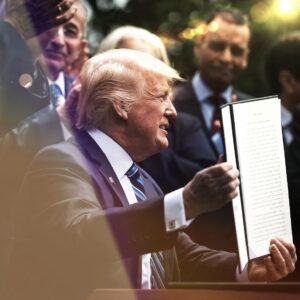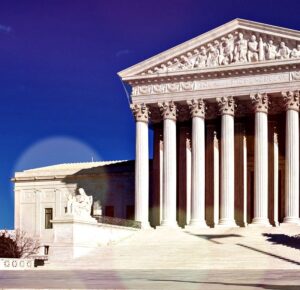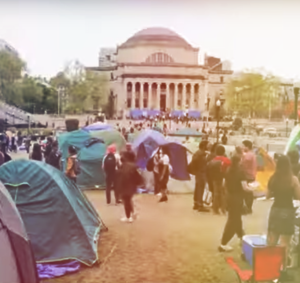Podcast: Play in new window | Download
Federal Court Challenges to Trump Administration Arguments
The number of active lawsuits in federal courts challenging Trump administration arguments has now topped 100. In 21 of those cases, judges have already issued temporary restraining orders or preliminary injunctions, effectively stopping, at least for now, parts of Trump’s agenda.
For example, as reported in the New York Times this past Sunday, trial court judges have blocked for now Trump’s mass firings of civil servants, Musk’s access to sensitive federal agency data, the relocation of transgendered women inmates to men’s prisons, the pursuit of immigrants inside houses of worship, and the freezing of up to $3 trillion of federal funding to the states. And in a very important case, a federal judge entered a final judgment reinstating the head of the federal watchdog agency. And just yesterday, the Supreme Court ruled against the Trump Administration halting the sending out of those billions of foreign aid dollars.
But it must be pointed out that in a number of preliminary victories against Trump’s actions, the government, though losing the first round in the case, have nevertheless stalled in obeying the court’s orders. And Trump, himself, posted the absolutist notion that, “He who saves his Country does not violate any Law.”
Five of the judges who have ruled against Trump were appointed by Republican presidents, one by Trump himself. As a result of Trump’s losing record in court cases so far, there is now talk on the right of seeking to impeach judges who rule against the Trump Administration. And the number of death threats judges are experiencing from the public have gone up alarmingly, as well.
Guest – Stephen Rohde is a civil rights activist, author, and constitutional scholar. He practiced civil rights law for almost 50 years. He currently serves as chair of the Interfaith Communities United for Justice and Peace (aka ICUJP), which was formed in the wake of 9/11 for the purpose of organizing faith-based communities to call for an end to war and violence. He is also a past President of the ACLU Foundation of Southern California, and past Chair of Death Penalty Focus, and Bend the Arc: A Jewish Partnership for Justice. Despite that long list of affiliations, today he’s not speaking on behalf of any of those organizations.
—-
Free Speech Protections Threatened Under Trump Administration
On March 4, 2025, President Donald Trump threatened to cut federal funding to colleges that permit what he calls “illegal protests.” This statement on social media has sparked a wave of reactions from civil rights groups as a direct attack on fundamental freedoms such as speech and assembly.
In his post, Trump echoed ideas from previous executive orders, including his 2019 order and one issued in January, which specifically targeted pro-Palestinian student protests on college campuses, calling them antisemitic. But Trump’s latest comments go further, asserting that any protest deemed illegal would lead to harsh consequences, including the imprisonment of agitators and expulsion or arrest of American students. The details, however, remain unclear, particularly around how the government would define “illegal protests” or the enforcement of such measures.
Trump’s latest threat has reignited concerns about the balance between freedom of speech and government intervention on college campuses. It also raises important questions about the rights of students, faculty, and protesters in the context of broader political and social movements.
Guest – Attorney Mara Verheyden-Hilliard from the Partnership for Civil Justice Fund and the Center for Protest Law and Litigation in Washington, DC. Mara is one of the nation’s leading litigators defending protesters and winning numerous reforms in police practices at mass assemblies and demonstrations.
———————–




